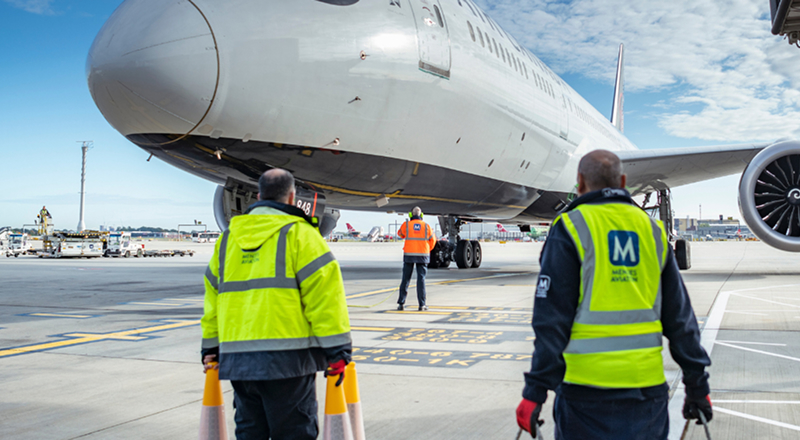Since 2019 Agility has partnered with several organizations to provide food to families in need during Ramadan, including the Al Ber Foundation and the Kuwait Food Bank. In addition to food assistance Agility has also donated warehouse racking that can be used by the Al Ber Foundation to increase the amount of food that can be stored for distribution throughout the year to help the Foundation to reach more people in need of food assistance. The warehouse racking will enable the Al Ber foundation to reach thousands of more people on a yearly basis without incurring additional food storage costs.
In coordination with the Dewan Kampung Maju Jaya, a local non-profit organization in Johor Bahru, Malaysia, Agility employees procured and distributed essential household items to 15 families (60 people) affected by floods. The food baskets included sugar, salt, cooking oil, canned food, rice, soap, and detergent, among other goods.
Five Years Supporting UNHCR from Agility on Vimeo.
With Agility’s support over the past five years, UNHCR was able to help people in Malaysia, Jordan, Lebanon and Uganda with basic needs, from livelihoods, education to health interventions.
Agility’s Paperless Branch initiatives involved the implementation of an integrated document management system, which provides a central repository for all job-related documents. This isn’t just good for the tracking and fidelity of job information, as well as operational efficiency, it’s also good for the environment.
An average office worker uses 10,000 sheets of copy paper each year, and nearly 50% of that ends up in the trash. Implementation of the system in three of our offices, Barcelona, Hong Kong and Penang, has reduced our demand for paper by almost one million sheets per year; the equivalent of over 100 trees. In the Barcelona branch, the implementation of the system led to a monthly reduction in paper usage by more than 70%.
Agility offices across the globe have joined the Waste-Free Agility campaign to eliminate the use of single-use plastic water bottles and paper coffee cups. The Waste-Free Agility campaign calls on our facilities to meaningfully reduce or eliminate an important waste stream through changes in behaviour.
For example, at Agility’s offices in Mumbai, guests were given small plastic water bottles. Much of the water ended up going to waste, so our team there started to use glasses and a carafe, which reduced waste of water, and entirely eliminated the single-use plastic bottles. Unused drinking water is recycled for cleaning purposes as well. While it did require a change in behaviour, managers across India were enthusiastic to jump on board, and the elimination of single-use plastic bottles has become a country-wide trend for Agility.
Other Agility offices in Brazil, Italy, Singapore, the US and Australia also are leading the way in the elimination or significant reduction of the use of plastic water bottles, paper coffee cups, or other single-use materials. We’re aiming for 100% office participation!
Our increasingly warmer world has an impact on the safety and comfort of our employees, as well as our energy costs. Agility Hong Kong invested in four industrial High Volume, Low Speed (HVLS) fans that cool down the high temperature of the warehouses on hot summer days, keeping employees comfortable.
Six HVLS fans can do the work of 300 small space fans, using less than one tenth of the energy. Unlike a small, high-velocity fan that creates small, turbulent air streams that quickly disperses, the HVLS fans, with diameters of up to 7.3 meters, rely on size, not speed, to move a significant amount of air. Streamlined aerodynamic, air-foil blades move a large mass of air, producing silent, non-disruptive, even distribution of breezes over large spaces, fulfilling to the double functions of ventilation and cooling. In warehouse spaces, it’s a challenge for ventilation to reach the floor and corners of buildings where people and equipment are located. HVLS fan can solve this problem by sending a well-aligned wind in full space.
Based on positive feedback, Hong Kong plans to invest in fans for all of its warehouses in coming years.
In November 2019, Agility Singapore made the move to 100% renewable electricity by installing solar panels on the rooftops of all of our facilities. The total array will have more than 6 thousand panels and has a capacity of over 2 mega-watt peak. 100% renewable energy generated from the panels will cover all of Agility’s energy needs additional power will go back into Singapore’s energy grid. The solar PV installation is the largest for Agility Asia-Pacific so far.
This June, Agility Spain has committed to source 100% renewable energy for all facilities (offices and warehouses). The renewable sourcing guarantee comes in the form of renewable energy credits (RECs) from Nexus Energía, a renewable energy provider active in Spain, Portugal and Germany.
RECs come in units of kilowatt hours and offset electricity generated from non-renewable sources. They are different from carbon offsets, which are measured in tons of CO2 and offset emissions from any source. RECs are a finite asset, limited to the country’s total production of electricity from renewable sources in that year. Spain’s Guarantee of Origin system for RECs helps to ensure that corporate sustainability efforts contribute directly to driving the development of renewable energy generation in the Iberian Peninsula.
Transitioning to renewable energy, whether for electricity or fuel, is the most important action Agility operations can take to reduce our environmental impact. Where installing solar panels is not possible or economically viable, RECs offer a great alternative to reduce our carbon footprint and drive positive change in our communities.

